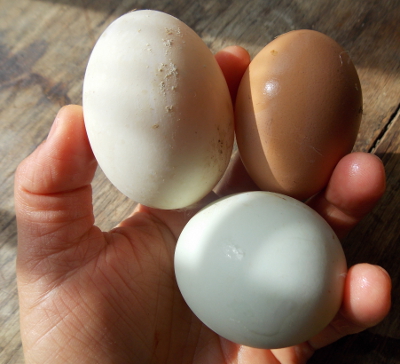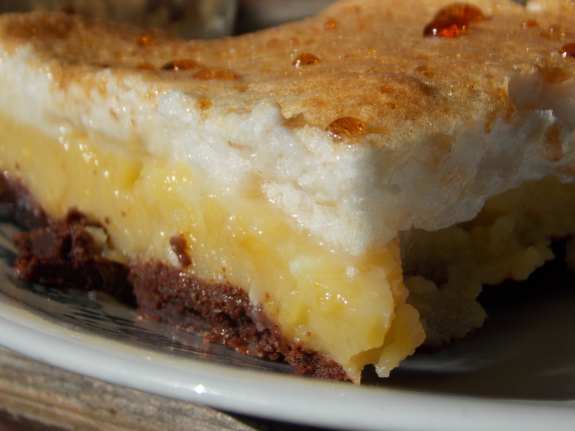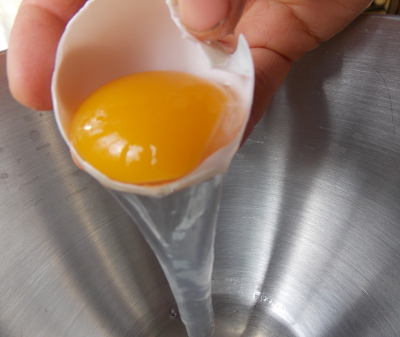
Pros and cons of duck eggs
 When I talked Mark into letting me experiment with ducks,
what interested me the most was the waterfowls' reputation for laying
well in the winter months even without lights in the coop. And I'm now
ready to say that their reputation is well deserved! We currently have
three point-of-lay pullets in the chicken department and five
similarly-aged ducks, and we receive about four eggs a day from the
latter (80% lay rate) and one egg a day (if we're lucky) from the former
(25% lay rate). Granted, this is without supplemental lighting in the chicken coop,
which would have increased our chicken-egg numbers, but that's
definitely a striking difference and a major mark in the pro-duck
column!
When I talked Mark into letting me experiment with ducks,
what interested me the most was the waterfowls' reputation for laying
well in the winter months even without lights in the coop. And I'm now
ready to say that their reputation is well deserved! We currently have
three point-of-lay pullets in the chicken department and five
similarly-aged ducks, and we receive about four eggs a day from the
latter (80% lay rate) and one egg a day (if we're lucky) from the former
(25% lay rate). Granted, this is without supplemental lighting in the chicken coop,
which would have increased our chicken-egg numbers, but that's
definitely a striking difference and a major mark in the pro-duck
column!
However, I've also
learned that not all eggs are created equal. Duck and chicken eggs look
similar but taste and cook quite differently. The first thing you'll
notice is how dirty duck eggs get if you don't harvest them from the
coop very promptly --- ducks can't hop up into raised nest boxes, so they'll walk all over their eggs after laying and coat them with filth.
This can be a health issue since washing can sometimes push bad
bacteria through the shell and into the eggs, so we usually give dirty
eggs to Lucy (who thinks all eggs are created equal).

Assuming you manage to
swoop up the clean eggs in time (which we're getting better at), the
next distinction comes when you crack a few eggs open. Duck eggshells
are harder, and they have a thicker membrane underneath, which means
that tiny fragments of shell are more likely to end up in your egg if
you're not very careful. I'm getting better at preventing this, but I
still spend quite a bit of time chasing tiny egg fragments through my
uncooked eggs each morning. Unfortunately, I haven't found any solution
for the very glutinous whites in the duck eggs, which tend to leave a
streak of goo on the counter every time I try to decant the filling from
the center of an uncooked egg.
 Which
brings me to cooking. Here, I'm on the fence about which type of egg I
prefer. In cakes, duck eggs shine, resulting in a pastry that is so
perfect that it's nearly impossible to stop eating after one piece. (No,
despite what you think, that isn't
the bad part about cooking with duck eggs.) However, when scrambled,
I'm less of a fan. It's important to cook duck eggs more slowly and at a
lower heat than chicken eggs, but if you don't want to go over the edge
into burning, the result always feels just a tiny bit less cooked than
it should be. In a perfect world, I like to mix in at least 40% chicken
eggs when scrambling so that the result tastes "normal."
Which
brings me to cooking. Here, I'm on the fence about which type of egg I
prefer. In cakes, duck eggs shine, resulting in a pastry that is so
perfect that it's nearly impossible to stop eating after one piece. (No,
despite what you think, that isn't
the bad part about cooking with duck eggs.) However, when scrambled,
I'm less of a fan. It's important to cook duck eggs more slowly and at a
lower heat than chicken eggs, but if you don't want to go over the edge
into burning, the result always feels just a tiny bit less cooked than
it should be. In a perfect world, I like to mix in at least 40% chicken
eggs when scrambling so that the result tastes "normal."
I'd be curious from other duck-keepers. What do you feel are the advantages and disadvantages of duck eggs?
Want more in-depth information? Browse through our books.
Or explore more posts by date or by subject.
About us: Anna Hess and Mark Hamilton spent over a decade living self-sufficiently in the mountains of Virginia before moving north to start over from scratch in the foothills of Ohio. They've experimented with permaculture, no-till gardening, trailersteading, home-based microbusinesses and much more, writing about their adventures in both blogs and books.
Want to be notified when new comments are posted on this page? Click on the RSS button after you add a comment to subscribe to the comment feed, or simply check the box beside "email replies to me" while writing your comment.
- Remove comment
- Remove comment
- Remove comment
- Remove comment
- Remove comment

- Remove comment
